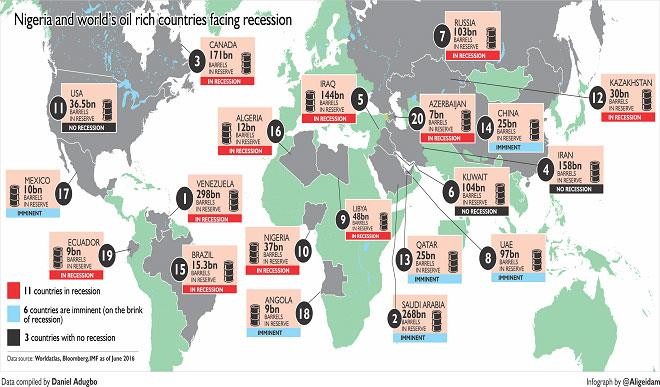Recession: The way forward
In spite of the fact that Nigeria economy has officially been announced to be in recession, the good news is that, it can be boomed within a shortest frame of time if Nigerian government set its priority on some important parameters Nigeria is one of the most developed countries in African but currently, is losing […]


In spite of the fact that Nigeria economy has officially been announced to be in recession, the good news is that, it can be boomed within a shortest frame of time if Nigerian government set its priority on some important parameters
Nigeria is one of the most developed countries in African but currently, is losing its status as a leading economy because of flimsiness in its economy. The rapidly shrinkage in Nigeria’s GDP has calls for the Federal Government to go back to the drawing board to re-strategize.
Analysis has shown that in July 2014, Nigeria’s GDP stands at 6.23 percent. Consequently in July 2015, it dropped drastically to 2.84 percent and since July this year, it is completely in recession with -2.06 percent, the worst in the last 20 years.
This is because Nigerian economy has so much being relied absolutely on some certain sectors alone. Service is the largest sector of the economy, accounting for about 50 percent of total GDP. One of the fastest growing segments in service is Information and Communication, which together account for about 10 percent of the total output.
Agriculture which, on the other hand, was the biggest sector in the past, now weigh around 23 percent. While the crude oil and natural gas constitutes only 11 percent of total GDP, and being the main exports; industry and construction, account for the remaining 16 percent of GDP.
Economic recession is currently a worldwide phenomenon because like Nigeria presently, some countries like Brazil, Guinea, Burundi, Ireland, and Greece among others are under economic recession as well. However, Nigeria government can address this economic issue within a shortest frame of timea if it engages farmers, entrepreneurs, manufacturers, local as well as foreign investors.
The Nigerian government should bring in as many stakeholders and investors to come and invest in critical sectors such as agriculture and mining.
Furthermore, if government must make use of business to address this current economic downturn, it must also reduce the cost of doing business and also make available, adequate supply of power in order to allow for smooth running of businesses.
Subsequently, the government must also provide a cheaper mode of transportation. The high cost of transportation can cripple businesses. Hence, the government should boost rail transportation.
Additionally, the economy can also be boomed within a shortest period of time if government would encourage and strengthen youths with empowerment programmes that will further increase their interest in entrepreneurship. This is because until Nigeria’s government begin to engage its large population especially the youths into productive activities and contributing to the GDP, it will be difficult to boost this economy.
Although other countries are also reliant on primary sectors such as agriculture and natural resources, the difference is clearly on diversification. This is also the way forward for Nigeria.
Nigeria must make its burgeoning population count by developing its economy and local industrial production before it can be able to enhance its standing in the prosperity rating index. Otherwise our population will continue to tell negatively on our GDP and it will be very difficult to get out of this recession.
Jiya Peter, Lapai, Niger State
